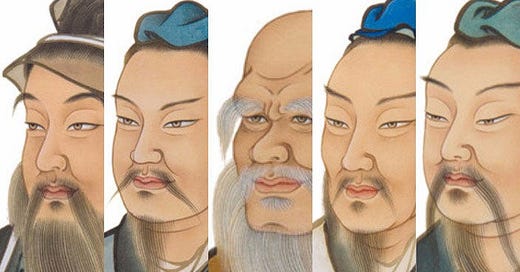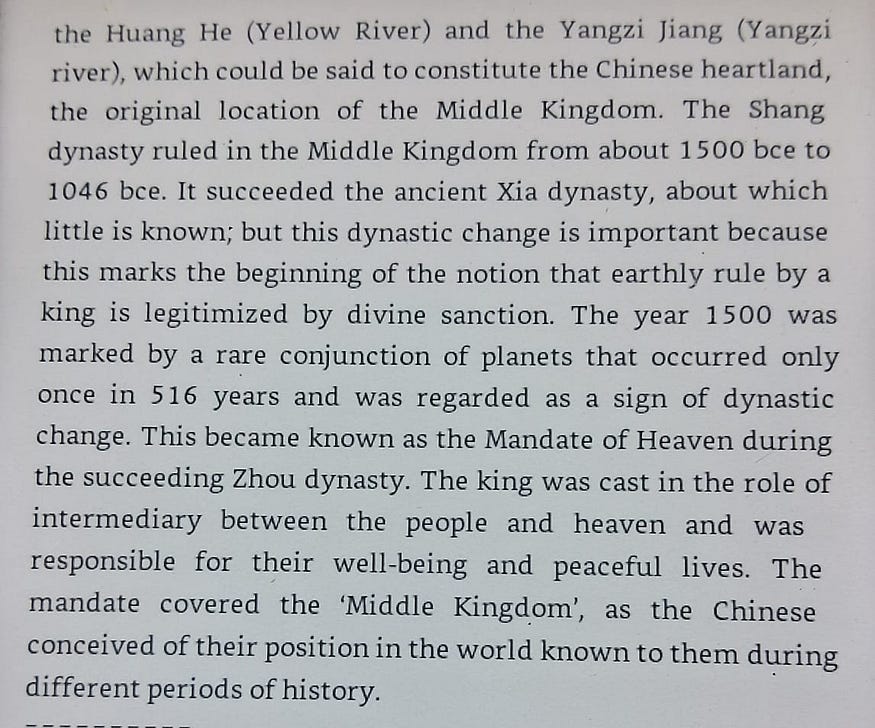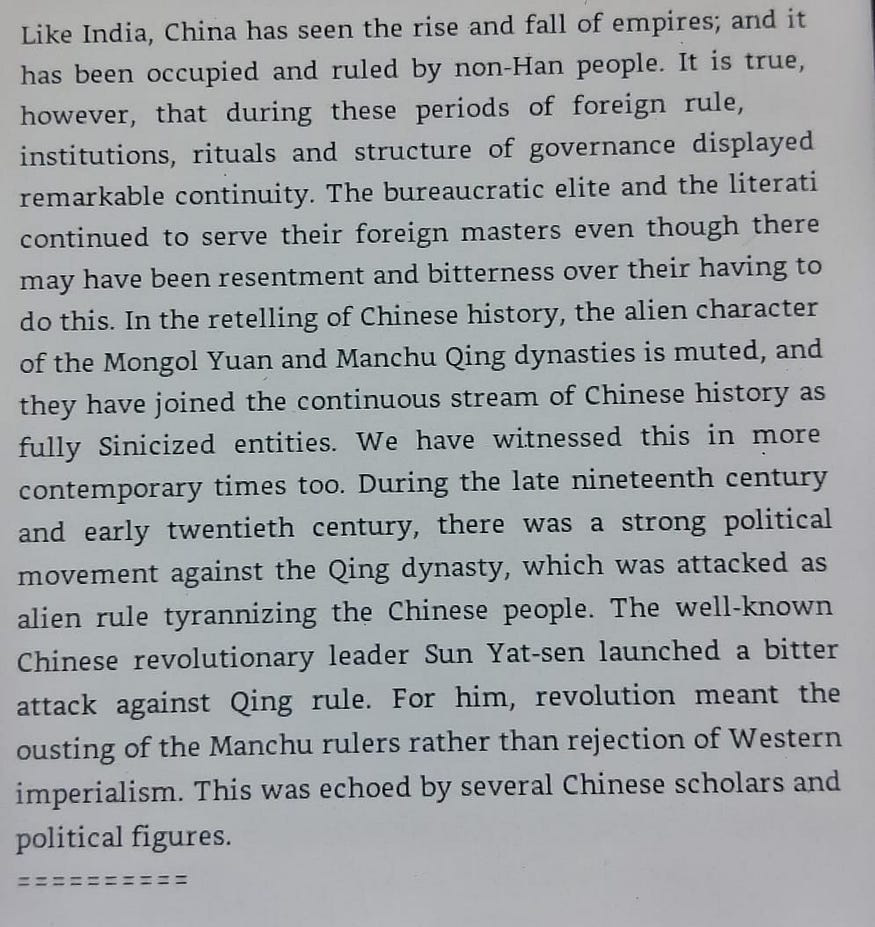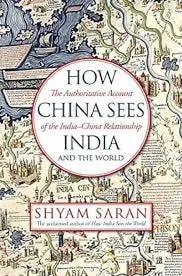China: Swayambodha
To understand the present day Chinese State, we need to understand how they view their society, themselves and their enemies.
Let us first begin by understanding the Chinese Swayambodha as the scholar and intellectual Pankaj Saxena defines it. China in the present is a civilizational state and acts as one, it clearly defines its interest and has schemes to achieve what they perceive to be their rightful position in Asia and the Globe. They have articulated a spatial and ideal notion of their civilization on the basis of their cosmology. It seems a move towards establishing a cosmological argument for Han centrality over the world which began during the warring states and Early Han period which seems to have paved the ground work for declaring the Chinese State as the Middle Kingdom having the Mandate of Heaven which gives its emperor the divine right to rule over all dominion under his empire. Han centrality is both a concept and sociological process and is seen as Chinese centrality as the modern day Chinese identity is bereft of any major influences from its past rulers such as the Manchus, Mongols and their minorities like the Tibetans.
Let us first try to decouple these three aspects of Chinese consciousness from one another and understand them as individual concepts and then see how their fusion forms the basis of modern day Chinese identity and provides legitimacy to the Chinese State.
Let us first look at the notion of being the Middle Kingdom. In the book “How China Sees the World and India”, the author notes that a distinctive Chinese identity began to emerge when the communities settled down in the middle of the confluence the two great rivers which were the Huang He(Yellow River) and the Yangzi Jiang and was the location of the original Middle Kingdom, as the size of the empire increased so did the middle kingdom and the philosophical reason of their expansion within their legalist-Confucian framework. The conception of the Middle Kingdom is based in their belief of them being in the ‘Center of the Universe’, a belief bolstered by their great technological and cultural imports and accomplishments. Another reason for calling themselves the Middle Kingdom also comes from the belief that China is the pathway between the rest of the earth and heaven itself. This feeds into bolstering their belief of how their expansion was divinely ordained(historically) and now is used by their present-day revolutionary state to justify their expansionism and militarization.
The Mandate of Heaven is a concept which gave legitimacy to the their rule over the ‘Middle Kingdom’ and all under heaven, but it is different than the European concept of God giving legitimacy to the king because unlike European Monarchs, the Chinese conception of the Mandate of Heaven gave them and the present Chinese State the legitimate reason to expand, in the medieval ages it gave them the right to expand over into neighbouring regions under the rule of tribes, the Chinese(Han) considered ‘Barbarians’. This concept was invoked by the Zhou when they overthrew the Shang even after having a much numerically less forces and believed that they were able to do so because of them having the blessings of the gods and the Mandate of Heaven to rule over the Middle Kingdom and unlike the European divine right to rule was used to overthrow an already existing dynasty. Ancestral worship within Chinese culture also started to increase after this and grew even more after the Warring period as they believed that their ancestors in heaven would guide them with the help of the divine even though it was present since the Xia dynasty . In the modern day Chinese State it has been replaced by the ‘Mandate of People’ while it functions just like the Mandate of Heaven.
Han Centrality as a sociological process is fascinating because it gives China the belief that is has never been conquered over by another people or civilization, even though they have been by the Mongols and Manchus who were not Sinicized(Hannized). The argument made by the modern day Chinese Scholars is that, it was not Mongols or Manchus that conqured them, but that the Hans who conquered the Mongols or Manchus in a cultural sense. Its an argument similar in vein to that made by British scholars regarding, William the Conqueror who was from Normandy which is in present day France. The argument being that while William conquered the land we call the Britan, the people of these lands conquered him culturally. In case of China, we see that even when it was not true, as was the case with their Mongol dynasty, The Yuan dynasty, historical revisionism goes a long way to prove that they had been Sinicized beforehand. This process of Sinicization fell apart during the fight to form the Chinese Republic under Sun Yat Sen and his compatriots who were all Han and the dynasty who they believed did not have the Mandate of the People and had brought the Chinese(Han) people shame was the Qing dynasty which was the dynasty of the Manchu people, who the Republicans targeted as being foreign as well. This has been historically revised given the present ideological requirements of the Chinese-State. Han Centrality is also a belief in their cultural, racial and civilizational superiority over other races, cultures and civilization.
All these concepts come together to form the basis and foundation of the present day Chinese Identity and provides it with a strong undergirding as the present day Chinese State uses the “Mandate of the People” to legitimize their rule while its practical usage remains the same as the Mandate of Heaven and as the Chinese State has this mandate and it is the Middle Kingdom between the Heavens and the Earth, they have the divine right to expand and take over territories they see fit and Han Centrality provides a belief of superiority supplemented by their belief that they have never been ruled by a foreign entity or been shamed by then due to the process of Sinicization having firm foundation in Han centrality until the Century of Humiliation which forms the basis of their Shatrubodha and undergirds their defensive and foreign policy which I will get into a later article.
Footnotes:










